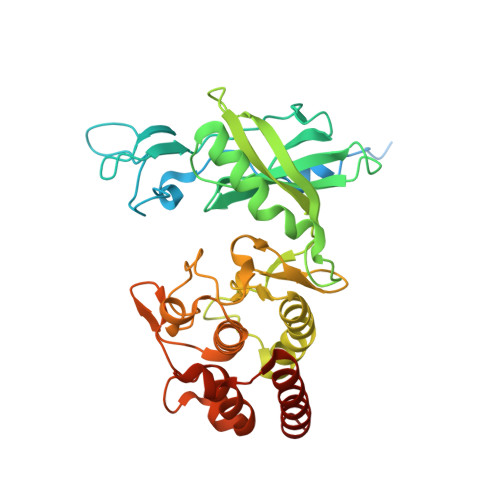Molecular Basis of the Activity and the Regulation of the Eukaryotic-like S/T Protein Kinase PknG from Mycobacterium tuberculosis.
Lisa, M.N., Gil, M., Andre-Leroux, G., Barilone, N., Duran, R., Biondi, R.M., Alzari, P.M.(2015) Structure 23: 1039-1048
- PubMed: 25960409
- DOI: https://doi.org/10.1016/j.str.2015.04.001
- Primary Citation of Related Structures:
4Y0X, 4Y12 - PubMed Abstract:
Tuberculosis remains one of the world's deadliest human diseases, with a high prevalence of antibiotic-resistant Mycobacterium tuberculosis (Mtb) strains. A molecular understanding of processes underlying regulation and adaptation of bacterial physiology may provide novel avenues for the development of antibiotics with unconventional modes of action. Here, we focus on the multidomain S/T protein kinase PknG, a soluble enzyme that controls central metabolism in Actinobacteria and has been linked to Mtb infectivity. Our biochemical and structural studies reveal how different motifs and domains flanking the catalytic core regulate substrate selectivity without significantly affecting the intrinsic kinase activity, whereas a rubredoxin-like domain is shown to downregulate catalysis through specific intramolecular interactions that modulate access to a profound substrate-binding site. Our findings provide the basis for the selective and specific inhibition of PknG, and open new questions about regulation of related bacterial and eukaryotic protein kinases.
- Institut Pasteur, Unité de Microbiologie Structurale, 25 rue du Docteur Roux, 75724 Paris Cedex 15, France; CNRS UMR 3528, Biologie structurale des processus cellulaires et maladies infectieuses, Institut Pasteur, 75724 Paris Cedex 15, France; Université Paris Diderot, Sorbonne Paris Cité, Microbiologie structurale, 75724 Paris Cedex 15, France.
Organizational Affiliation:



















